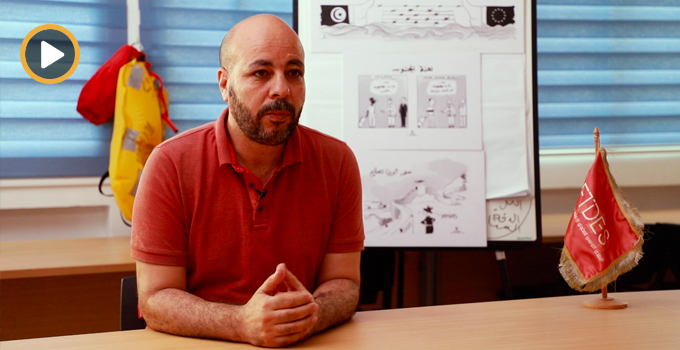
As the country faces a second wave of Covid-19 infections, the FTDES has published a new report focusing on Tunisia’s marginalized social groups during the first wave of contamination that began in March. The study, entitled « Management of Covid-19: State Policies and the Most Hurt Social Groups», considers different aspects of how the health crisis has been managed, focusing on segments of the population that have faced the most precarity as a result of the epidemic.
These groups include women farm laborers, cleaning ladies working in hospitals, construction workers as well as servers in cafés, restaurants and bars. What these groups have in common?Their work is precarious or informal. They are on the lowest rung of the social ladder and have found themselves defenseless against the Coronavirus.
« The general lockdown decreed in March was meant for the entire population. Except that in the face of the current situation, not everyone is equipped with the same capacity for resistance and resilience », Sofiane Jaballah, who coordinated the chapters of the FTDES report told Nawaat. « The government’s management of the health crisis was unjust. It is a continuation of 60 years of institutionalized injustice, as shownby the inadequacy of health facilities and the minimal level of financial assistance provided ».
Jaballah underscored that the preominance of a health approach in managing the first wave of Covid-19 contributed to exacerbating the impoverishment of certain socio-professional categories.
Zero Recognition for Cleaning Ladies in Hospitals
Amel Hazel authored one chapter in the FTDES report entitled « Female Cleaning Workers in Hospitals During Pandemic : Key Actors in the Fight for Life. According to Hazel, the work of cleaning hospital facilities is primarily undertaken by women. Starting with the premise that in hospitals these individuals are more exposed to the virus due to the daily handling of medical waste, Hazel examined the daily life of these employees, using the Houmet El Soukregional hospital in Djerba as an example.

At the outset of the epidemic, there was not enough protection equipment against the virus. Cleaning ladies faced high exposure to contamination. « We have a general problem with medical waste management which has gotten worse with the Coronavirus epidemic », Hazel told Nawaat. Not only were they facing what was at the time an unknown virus while being in continual contact with infected individuals, but they also had to be away from their families.
« Like the rest of medical personnel, female cleaning workers did not return home during this period. But we don’t really hear people talking about the sacrifices made by this professional group » Hazel lamented. According to her, Covid-19 should also be considered a work accident for cleaning ladies employed in hospitals.
Female Farm Workers More Vulnerable Than Ever
Although the minimum wage for farm laborers is fixed at about 16 dinars a day, female farm laborers make between 9 and 15 dinars. They were paid 13 dinars during the first wave of Covid-19, a sum that further decreases after deducting the cost of transport, according to the FTDES report. For the author of the study’s chapter on this issue, Ridha Karem, female farm laborers are subjected to different forms of servitude.
« Although they contributed to ensuring the country’s agricultural food supply during the first wave of Covid-19, they received no form of recognition from the State. Neither President Kais Saied nor the Prime Minister at the time, Elyes Fakhfakh, thanked them as they had thanked other professions. On the contrary, the Stateclosed its eyes to the continued exploitation of these women by agricultural land owners who ensured them neither adequate transport, nor a decent salary, nor social or medical insurance coverage. They also work without protection against the virus. In addition to the servitude they endure at work, they are responsible for housework at home and see their salaries taken by their spouses » Karem said, criticizing authorities.
Karem called on the State to ramp up labor inspections in order to oversee the working conditions of female farm laborers.

Increased Risks for Construction Workers
The study findsthat construction workers make upa vulnerable social classwhich faces the constant threat of unemployment and poverty, especially in moments of crisis such as that of Covid-19. Some of them work legally in construction companies while others are work in the informal sector, writes the author of the study’s chapter on this issue, Haithem Mdouri. With the announcement of a general lockdownin March, workers employed by construction companies did not receive their salaries for March and April, according to the study. They were unable to have any financial resources until the progressive lifting of the lockdownin May. What’s more, these workers did not benefit from the 200 dinar allowance provided by the State. Workers in the informal sector, paid by the day, also found themselves one day suddenly without work or an income.
« With the complete suspension of construction sites and the suddenannouncement of the ban on movingbetween regions, many workers often living far from their families found themselves stuck at their places of work. They could not go home. Many had to pay about 60 dinars for secret transportation. Not only were they deprived of their right to work but also their right to move freely », Mdouri said.
With the second wave of Covid-19 and the requirement to wear a mask, the study’s author highlighted that these measures are inapplicable on construction sites.
« Because it requires physical effort, their work does not permit them to wear a mask. While they don’t necessarily work close to one another, they are still not protected from the risk of contamination », he added.
Café Servers Underserved
Frequently changing their place of work, servers in bars and cafés often do not benefit from social security or work contracts, according Montassar Naghmouchi, author of the chapter of the study that deals with this issue. While the union of café and restaurant owners affiliated with Tunisian Confederation of Industry, Trade and Handicrafts(UTICA) mobilized to defend its members, the union of cafés, restaurants and bars affiliated with the Tunisian General Labor Union (UGTT) was totallyabsent when it came to defending workers’ interests, the studye notes. Naghmouchi shared the story of Atef, a server in a café paid 15 dinars a day. During the lockdown, Atef found himself one day suddenly without work and therefore without an income. Married and a father of two, Atef had to make do with his wife’s salary as a store vendor by drastically reducing the family’s expenses.

Like many other workers, Atef did not benefit from the State’s 200 dinar compensation allowance. Others lived off of credit before finding work in other sectors. This was the case for Imed, who started to paint buildings in order to get by. The owner of the café where he was working took advantage of the lockdown to fire his employees on the basis that he could not pay them during the crisis. According to Naghmouchi, informal work prevented the government from determining the number of café, restaurant and bar workers who were laid off or fired. As a result, many vulnerable employees in the sector were unable to receive financial assistance.
In the face of the coronavirus’ second wave in Tunisia, it is an economic approach that is taking precedence, said Sofiane Jaballah. « But this economic approach is dictated by the lobbies of the UTICA and even the UGTT as is shown, for example, by the fact that cafés and restaurants remained open under pressure from their owners, in spite of the alarming situation », Jaballah said. The « chaotic » management of Covid-19 will deepen the crisis of confidence between citizens and the State and also weaken the sense of belonging to this country, the author warned.
« Citizens are going to show even more contempt for the State. We foresee an increase in clandestine emigration and protest movements », he noted.





iThere are no comments
Add yours